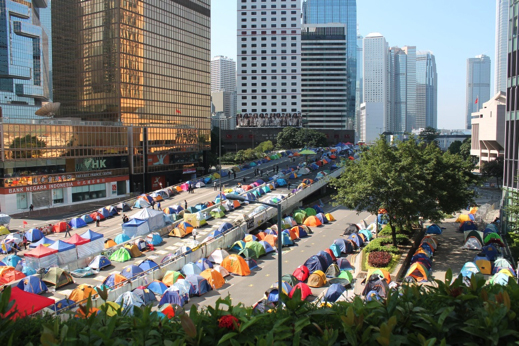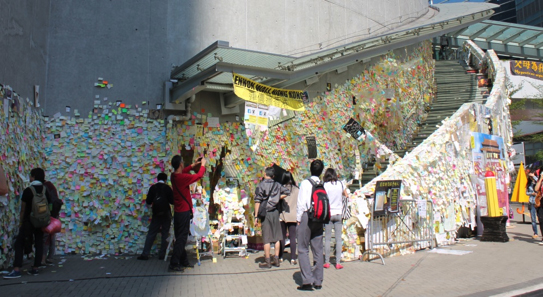Amanda Moore McBride, PhD, Bettie Bofinger Brown Associate Professor and associate dean for social work, Brown School; director, Gephardt Institute for Public Service
I write as a scholar of civic engagement who lives in St. Louis. I write having just returned from Hong Kong where I visited the “Umbrella Movement” protests at Occupy Central. I write in acknowledgement that a movement is growing worldwide from St. Louis’ Ferguson to Hong Kong to London and Mexico and at solidarity points in between. Citizen voices are singing a chorus for justice in the streets.
Civic engagement is characterized by social and political action. Social action reflects our care and concern for one another, how we express our support for individuals and groups. Political action reflects our collective governance and resource distribution, how we define rights and inclusion across the populace and act for them.
The latter is of concern in the context of Ferguson as well as Hong Kong. As a matter of citizen expression, political engagement has been of questionable status for some time – not just in Ferguson but across the United States. Our November 2014 elections stand as evidence with the lowest voter turnout since the early 1940s. I use this example of political engagement intentionally. The protestors in Hong Kong have demanded essentially one thing: suffrage, let us select our slate of candidates.
The United States is one of the most renowned democracies in the world, yet we consistently struggle to get out the vote (not to mention register eligible voters). The reasons for our political disengagement pertain to Ferguson. Citizens say that their votes do not matter; that those in office do not represent their interests; that as a result, voting is not a priority. The political representatives in Ferguson (and beyond) often have no opponents, are voted in by a minimal number of registered voters, and by consequence, do not represent the interests of the majority. The sentiment is that the “system” is so broken that it cannot be fixed, and those expressing this sentiment are primarily our youth.

When your interests are unrepresented and those unrepresented interests combine with others’ interests, the options for expressing your voice are at once limited and more accessible: you take to the streets. Protest as a form of political action is not a common form of civic action. Recent surveys reveal that less than 10 percent of the nation’s population will protest in any given year at any given time. That statistic joins other indicators of political disengagement, but it also reflects how protest is used purposefully and frankly, as an extreme measure.
To be effective as a form of civic engagement, the demands of protestors should be focused and clear. The actions should employ the most effective tactics of community organizing. Beyond consciousness raising, these actions force those in power to be disrupted, to be cornered in terms of their reaction. To do so in a democracy represents your civil liberty. At question in both the Ferguson and Hong Kong protests is when the line of liberty is deemed crossed by those who enforce the law and when that very enforcement then crosses the line. This epitomizes the protests of London and Mexico as well.
As I walked the Occupy Central camps and talked with protestors, I heard and felt the presence of the freedom fighters who shaped the democratic foundations of the United States. From Abraham Lincoln to Martin Luther King, their words have defined the Umbrella Movement. The Occupy Central protestors consider us to be an inspiration. They also have evoked John Lennon as a poet laureate for the peaceful demand for justice. The “Lennon Wall” is full of hopes for democracy, civic representation, and non-violence. We in St. Louis should have hopes for the same.
Share your views, listen to the views of others, and have hard conversations with your family, friends, colleagues, and strangers. Consume multiple forms and sources of media to shape your views. Know your rights; learn how a bill becomes law and many other civic processes. Attend and speak out at city council meetings and other public convenings. Contact your representatives of all types. Research judicial and other appointees. Serve as a juror when your number is called. Run for office, any office, if you are so inclined (and we need you to be inclined). Protest with purpose. And by all means, vote. From these actions, positive change can occur; prior engagement in these very actions is what gives us the opportunity to engage in them now.
Our spiral of disengagement from the civic realm helped contribute to this moment. Our civic reengagement can propel us forward.




Sorry, but you’re living in a fantasy world. The movement is not growing. Have you considered that the vast majority of Americans do not feel that the system is broken. Most are completely fine with the system. Why? Because unlike Michael Brown, most Americans do not break the law. Most Americans could care less about Ferguson or Michael Brown. Most Americans just want to be left alone to take care of their families. One thing is true of today’s protestors…the vast majority of Americans look at them as nothing but whack jobs. The blacks of Ferguson and St. Louis have set their own cause back decades by acting like a bunch of animals. “Burn the bitch down” is all mainstream America really needed to hear to cause them to change the television channel to the football game. No, there is no movement, except in the minds of academics who are completely disconnected from reality and no longer taken seriously. Have you considered what would happen to America if there were no police?? Just consider the image of Michael Brown wrapping his thuggish hand around a storekeeper’s throat. The police are the first and last line of defense, and most of them would risk their lives saving yours. Keep that in mind. And the next time you awaken in the middle night to the sound of someone in your house, call an Occupy member for help! See how that works for you…